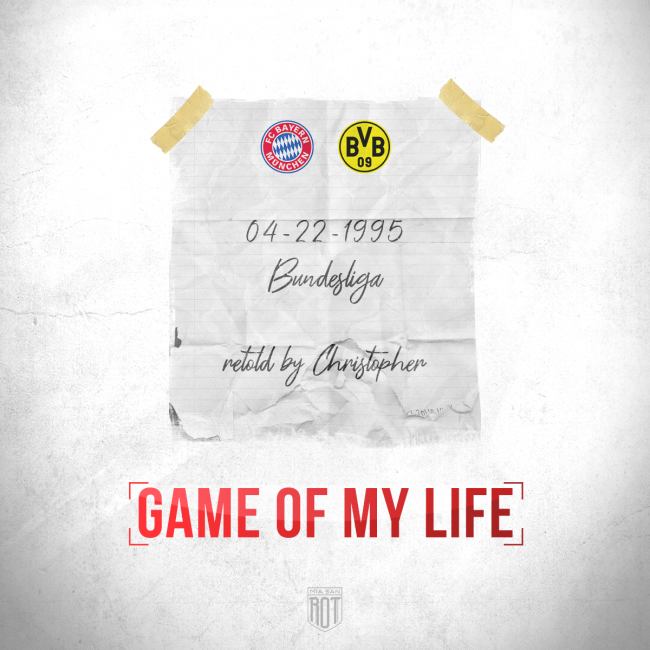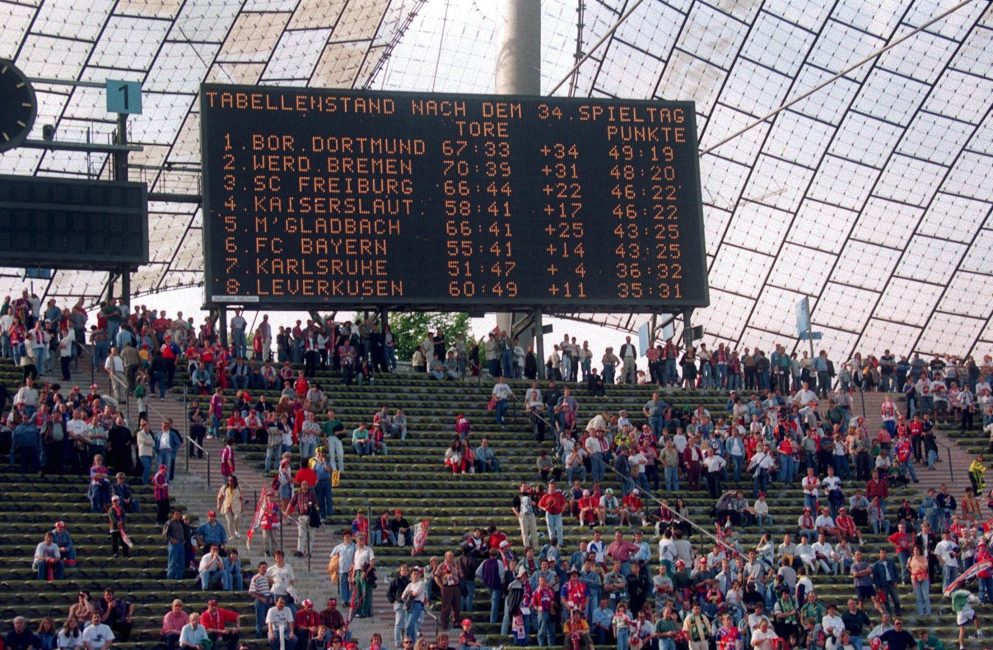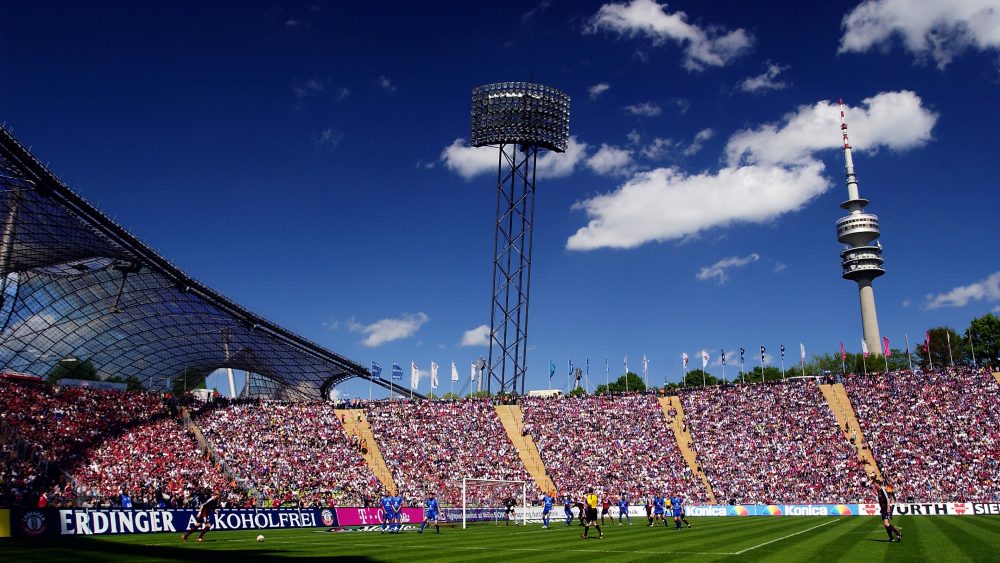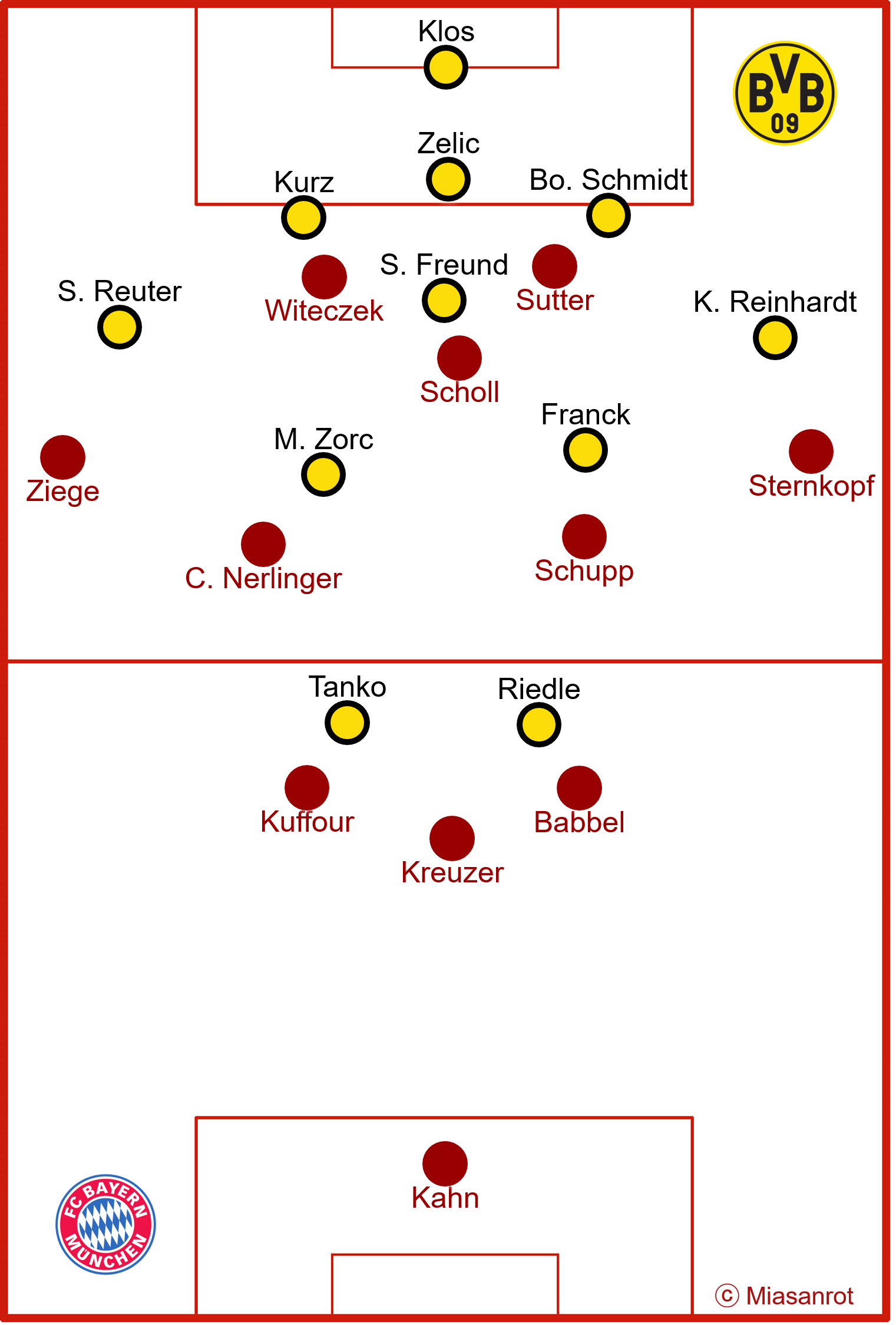Game Of My Life #05: How a 2-1 home win changed my life
A season in the thrall of transition
Bayern started the season as the reigning champions, having won the title in the 1993/94 season. That season cost Erich Ribbeck his job, he was released during the winter break. Shortly before the end of the season, Bayern lost 4-0 away to Kaiserslautern, almost squandering their title prospects in the process. Ultimately, 17 wins sufficed to secure Bayern the title.
So Bayern started the 1994/95 season as the title holders. Before the season began, Italian star coach Giovanni Trapattoni had been installed at the club to rebuild the club’s shaky foundation for sustainable long-term sporting success. To facilitate Trapattoni’s task, new players Oliver Kahn (€2.3m from Karlsruhe), Jean-Pierre Papin (€2.75m from Milan), and Alain Sutter (€1.4m from Nuremberg) were signed. Kahn had made a name for himself as a goalkeeping talent on the rise at Karlsruhe and was considered Germany’s future in goal. Papin arrived as a highly decorated star, having won the French championship four times with Olympique Marseille as well as the Italian championship twice and the Champions League once with Milan. He was also the world’s top scorer and winner of “Europe’s footballer of the year” in 1991. A bonafide world star had come to the Isar. On the other hand, Bayern’s squad had also taken some serious hits. Raimond Aumann, Olaf Thon, Bruno Labbadia and Adolfo Valencia had left the club during the off-season. No doubt the team was a team in transition. Besides the stars, there were also lot of young talents who had to be integrated as well.
Before the game against Dortmund
Champions League aftermath
Bayern had decided to put their focus for the season on the Champions League early on as their Bundesliga campaign never really flourished. They reached second place in the group stage and after a 0-0 in the first and a 2-2 in the second leg against Gothenburg in the quarter-finals, they even reached the semi-finals. There, after another 0-0 draw in the first leg, Bayern suffered a devastating 2-5 defeat in the return leg at the hands of van Gaal’s Ajax, a team replete with such future luminaries as van der Sar, de Boer, Seedorf, Litmanen, Kluivert and Davids, whose names would come to reverberate around Europe for years to come. With the loss Bayern had missed out on putting a positive spin on an otherwise disappointing season. They had no answer to the 3-4-3 system of van Gaal, but partly also brought about their own downfall through making quite a few individual mistakes before the goals themselves. And so the dream of the final in Athens lay in tatters.
Problems in the Bundesliga
Meanwhile in the Bundesliga, Bayern was in sixth place with six points off the top. The players did not feel comfortable with Trapattoni’s conservative tactics. The team was also hampered by a number of injuries. By the time of the confrontation with Dortmund, chief operator and midfield mainstay Matthäus had only got 16 applications, Kahn had 23. The goalkeeper was also unavailable in Amsterdam. Jean-Pierre Papin, who was meant to lead the line in attack, had only played six games. His goals were desperately missing in attack. Bayern’s dearth of goals was one of their cardinal problems throughout the 1994/95 season. They only managed to score 55 times all season, equalling 1.6 goals per game. 41 conceded goals on the other end were too many to make up for their paucity in attack.
On matchday 27, the fixture list saw Bayern meet then league leaders Dortmund. Dortmund was on top of the table level on points with Bremen (39 points), closely followed by a trifecta of Freiburg, Kaiserslautern (37 points) and Gladbach (36 points). Bayern was three points behind Gladbach and had to worry about qualifying for next season’s European competition, because at the time only the first five teams were eligible to compete in the Champions League and UEFA Cup.

In case you missed it
The starting lineups
Giovanni Trapattoni relied upon his customary 3-5-2 formation. Libero Thomas Helmer injured himself in the game against Amsterdam and was replaced with Oliver Kreuzer. In front of him, Kuffour and Babbel as center-backs and Ziege and Sternkopf as full-backs completed the defensive line. Bayern’s midfield consisted of Schupp, Nerlinger, and Scholl as the playmaker. Witeczeck and Sutter were the men up front.
Ottmar Hitzfeld’s Dortmund started in the same formation. The team contained a healthy mix of talents like Tanko, Ricken, Freund and Klos as well as seasoned professionals like Zorc, Reuter and Riedle. Dortmund should ultimately go on and win the title, while Bremen had to make do with second place after they lost 1-3 away to Bayern on the final matchday.
Things that caught our eye
I was only eight years old and the game was my first visit to a stadium at all. It was also my first trip to a big city being a child from a small village. Back at home in my village I was used to sports events that attracted say 150 visitors. On this day in April, I was about to be thrown amidst a crowd of 66,000 people in Munich’s Olympia Stadium. I can still remember the seemingly endless march from the parking lot to the stadium through the Olympia park. It seemed to take an eternity – and it probably did. We were late, very late. We had completely underestimated traffic and the distance to the stadium.
Shortly after 3 p.m., my uncle, my father and I entered the stadium. We had tickets for Block M in the main stand. We passed through entrance control and suddenly there was a giant video screen appearing before my eyes, so big that my mind could hardly fathom it. I had goosebumps all over my body. We proceeded to our stand and let ourselves be carried away by the atmosphere. The stadium lay below the entrance area. A sort of depression in the Earth’s surface. The sensation I felt was like a bath in a giant crowd with an endless stream of extremely loud music. “Go West” by the Pet Shop Boys pumped at full blast from the PA. On the pitch, both teams were going through their warm-up routines – and the south stand was already in a highly celebratory mood. That I was hardly able to see the players? Never mind. It was this wild blend of impressions that has made me the football fan I still am today, almost 25 years later. Bayern went on to win the match 2-1 thanks to goals from Zickler, who came on at half time, and Ziege. Each of the two goals was met with frenetic cheers. Being the child I was, I was overwhelmed by the occasion and had a hard time comprehending what exactly was going on. Dortmund got a goal back through Ricken minutes from time, but it was not enough. I was the happiest child in the world.

(Foto: Bongarts/Getty Images)
Important victory
The win did not help Bayern to finish the season higher than sixth because they were yet to lose on matchday 30 (0-1 against Karlsruhe) and 31 (0-2 against Leverkusen). They thus missed automatic qualification for the UEFA Cup, but because Gladbach, who were level on points in the league, were able to win the DFB-Pokal and, by doing so, qualify for the UEFA Cup Winners’ Cup (a marvellous competition at the time), Bayern took their place in the UEFA Cup. So there was European competition after all. Bayern should even go on to win the “Cup of the losers” next season, which was their fifth triumph in a European competition under Franz Beckenbauer as interim coach who had replaced Otto Rehagel after he had eliminated FC Barcelona from the competition. But that is another “The Game of our Lives” story for another day.






